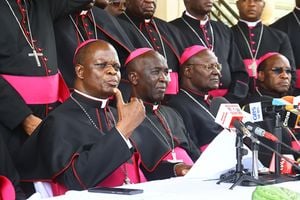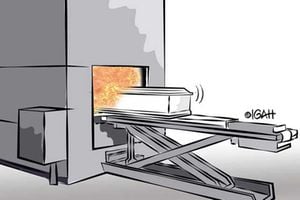
Mombasa County police check the CCTV cameras from their control room in Tudor on 31 December 2021.
A police officer from Makueni County manning traffic in Nairobi County for bribes while off-duty tells you how much police abuse their powers and are a nuisance to the public. One sure way of ensuring accountability in the Police Service, therefore, is to have every police officer, whether in uniform or civilian clothes, wearing body cameras. I have agitated for its introduction several times, and many Kenyans have supported the idea. Why does the government find it hard to buy body cameras for the police?
Body cameras are not only crucial in fighting crimes; they are just as important in protecting the police while on duty and the public. The most crucial role is their ability to collect and store evidence. This latter reason is what I believe is stopping the government from ordering the police to wear body cameras. If the government were sincere about supporting the police and protecting Kenyans, then it would have implemented the policy years ago.
Cases of Kenyans being abducted and later found dead rose following the June Gen-Z protest. Huge incidences of extrajudicial killings were also reported before Gen-Z’s disappearance. All these activities were blamed on the police and are still thought to be the work of the police. The government and the police itself have denied their involvement. The denial does not diminish the concerns Kenyans have for their safety, nor does it reassure the public that the government is doing anything about kidnappings and extrajudicial killings allegedly blamed on the police.
Extrajudicial killings
Apart from inaction from the government in solving kidnappings and extrajudicial killings, another challenge facing Kenya is the lack of evidence and faces of suspects allegedly behind the killings. The collection of evidence and the search for culprits is something that technology can now help with. Kenya is not lacking professionals in IT and police officers who could succeed in collecting evidence and identifying suspects, whether they are police officers or members of the public. The hurdles are put in place by the government itself when it fails to implement something as crucial as body cameras and modern technology as part of policing policy to help tackle crime and improve efficiency within the police service.
Lack of political will is now evident. What else is clear is the motive of the government. By not supporting the police in modernising and using the latest gadgets to collect evidence and identify suspects, the government is complicit in police transgressions. I believe it prefers the archaic form of policing that helps muddy the evidence and save the faces of those implicated in extrajudicial killings and kidnappings, especially if carried out as orders from senior officials. This position puts the police in a difficult circumstance and opens them to unnecessary and unfair legal proceedings. I am not suggesting the police are incapable of committing wrongful acts such as extrajudicial killings without the consent of their superiors. However, the events surrounding police activities during protests and the arbitrary arrests and killings of anti-government activists allegedly by the police point a finger at powers above the police.
Providing evidence
What appears to be a state-sponsored exercise has left some police officers having to answer for crimes that took place on orders from above. Nonetheless, in the absence of such orders, the police would have helped the justice process by providing evidence captured on their body cameras. They would also have been in a position to protect their reputation if the body cameras showed they were not part of a killer squad. They are left in a catch-22 due to the lack of support to modernize the police service to include body cameras, street cameras, and effective IT services that would have helped in processing evidence and images crucial in fighting crimes and dealing with human rights violations against civilians.
The police reforms highlighted in the recent report by Justice David Maraga’s team are yet to be implemented. The suggestions made in the report to improve the police service, coupled with the introduction of technology into the police service, would have improved the way the police conduct themselves when dealing with the public and hopefully also help them tackle crime-related incidents in a professional and authentic manner.
A lot of public funds are used on non-essential items such as the refurbishment of good quality government buildings, buying furniture, and expensive cars for senior government officials. It is also being spent on an ever-ballooning public service. Why should the country have several government spokespersons and their deputies, not to mention backroom staff for each one of them?
A lean and less expensive government would save the country money that could be used to improve not just the welfare of the police officers but also modernise the police to be as effective as any in the world.
Ms Guyo is a legal researcher, [email protected], @kdiguyo









